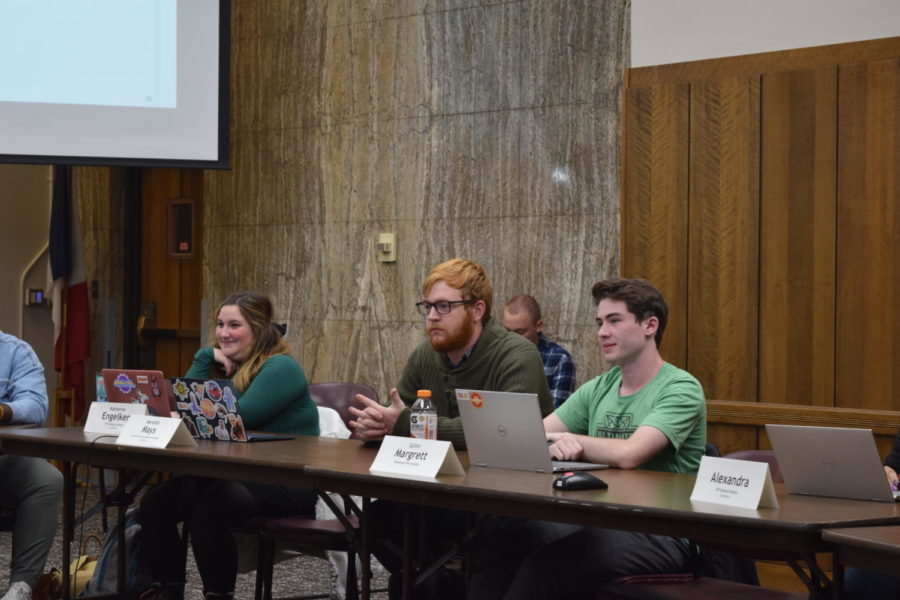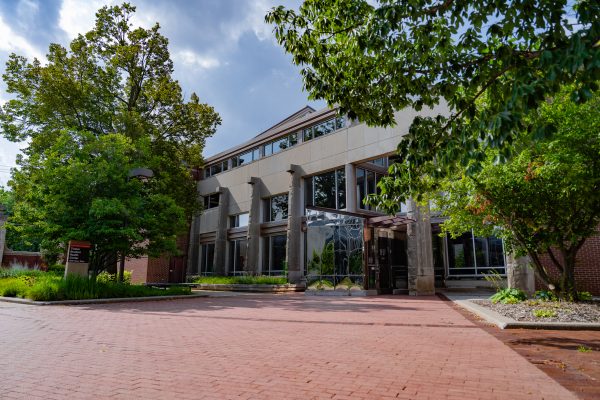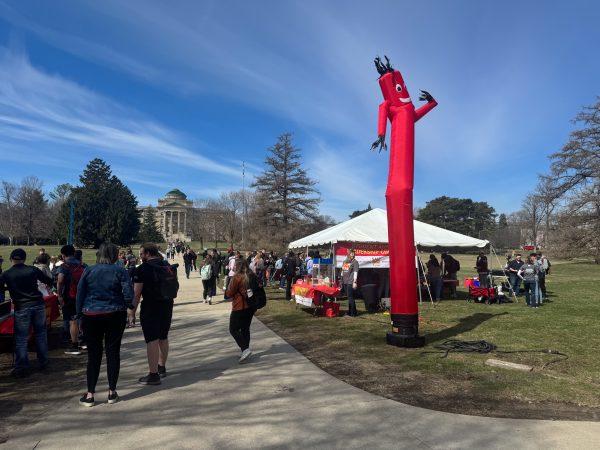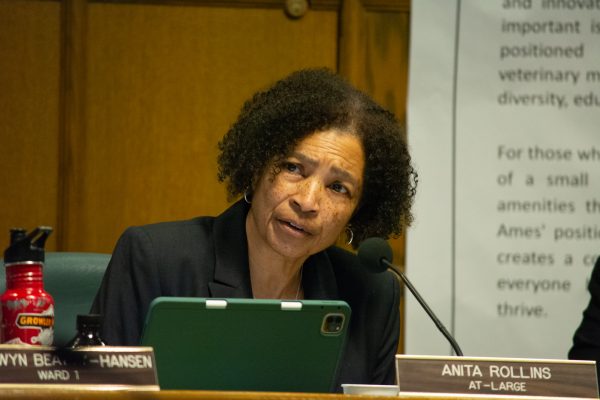StuGov prepares to allocate funds toward Black Homecoming
Former chief justice also confirmed to sit on the Senate.
Newly serving Off-campus Senator Alex Cecil (middle) used to serve as the Chief Justice for Student Government’s Supreme Court.
The Senate saw a bill in regard to the funding of Black Homecoming. The bill totaled $4,990 and will be seen by the finance committee before being voted on Wednesday.
Black Homecoming is a collaborative event between the Black Student Alliance, African Student Association, National Society of Black Engineers and the National Panhellenic Council. According to the bill, the homecoming aims to build a sense of community. The legislation was written by Obi Agba, a Black senator who represents the College of Liberal Arts and Science.
“This event is essentially just trying to emphasize community within Iowa State for not only black students, but students of color, since that is obviously something lacking since we are in Iowa and at a PWI, and retention and graduation rates are low for students of color,” said Mary Malausky, a junior in psychology and director of diversity, equity and inclusion for Student Government.
Malausky said Iowa State’s low retention and graduation rates for students of color are in line with national standards, adding that community building efforts help to combat the low retention and graduation rates.
Student Government Vibes
A bill named “Funding Student Government Vibes” saw the floor for first read. The bill consisted of a line item titled “Spotify Premium Student Account” for $60. As the bill currently stands, the money would come out of the Senate Discretionary fund if it were to pass next week.
According to the author of the bill, College of Agriculture and Life Sciences Senator Jennifer Holliday, a sophomore in agriculture studies, the bill is to build a sense of community within the Senate.
“Talking with various Senators and people serving on Student Government, we thought that music kind of serves as a sense of culture and building of community,” Holliday said.
She also said that the account would be used for music in the Student Government office, as well as for student-facing events hosted by the organization.
First read bills can only have ‘yes or no’ questions asked to the author, and Senator Yonting Goh, a graduate student in finance, asked if the bill would be a misuse of student activity fees.
Holliday responded ‘no.’
Ann Lent, a senior in political science, asked if someone with a Spotify Premium account logging in was a feasible alternative.
Holliday responded ‘no.’
This bill comes in the midst of the Senate forming a budget review task force and decreasing funding for some organizations during last year’s annual allocation process.
Seating a Senator
The Senate seated the former Chief Justice Alex Cecil, a senior in agronomy, as an off-campus Senator.
Cecil has served on the Supreme Court for over two years but says he thinks it is best for him to move on, though he is sad to leave the court.
“I think it’s good to have fresh eyes on what the court is doing because I was still looking at it as if it wasn’t existing,” Cecil said.
Cecil said one project on his mind is pursuing clarifications on the mental health resources on campus.
Senate Breakdown
The Senate has voted on 33 pieces of legislation in nine meetings this term. Here is how they break down:
- 17 committee seatings
Six Senator seatings
Six funding bills
Four other pieces of legislation in regard to internal matters
Agendas have been shorter than in years past. According to Andrew Brueck, a senior in political science and vice speaker of the Senate, the shorter agendas are in part because the organization is in the process of re-writing the organization’s bylaws. In general, previous bylaws changes have come one-by-one rather than in a package like the rewrite will.
Edward “Eddie” Mahoney, a graduate student in computer science and speaker of the Senate, said more bills should be on the way.
“Things are starting to pick up,” Mahoney said “We have a new Senate this year, people are starting to get more comfortable writing bills, getting more comfortable participating in legislation.”
However, Mahoney thinks there could be more participation on floor discussion.
“I do think there are multiple factors in play here,” Mahoney said. “Part of it is we haven’t had, at least this semester, a lot of legislation that is very controversial. We are a Senate that is a little more cohesive than years past, we are a little less divisive at times.”
Your donation will support the student journalists of the Iowa State Daily. Your contribution will allow us to purchase equipment, send our student journalists to conferences and off-set their cost of living so they can continue to do best-in-the-nation work at the Iowa State Daily.











Robert Bowen | Oct 20, 2022 at 12:26 pm
On the Black Homecoming, I don’t think we will ever have unity or community in our schools or country as long as we continue to label people by the color of their skin. If you are born in this country you are an American, that is it plain and simple. I don’t think you would see these type of labels say in Great Britain. Over there you are a Brit. We need to stop dividing this country by labeling people based on the color of their skin.
Thank you for your time.
Robert Bowen
Marion,Iowa